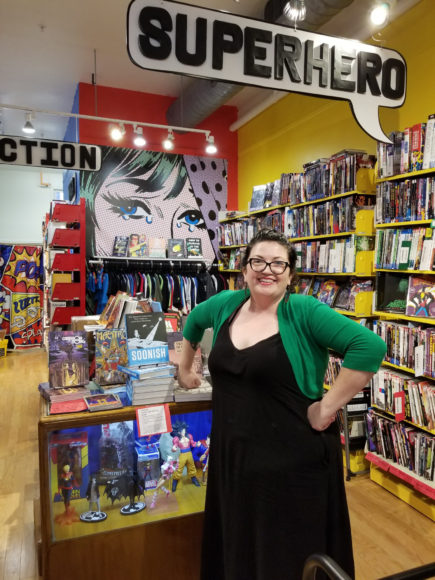Patricia Ross, Raphael Strumlauf and Kate DeNeveu each have at least one thing in common: They’re generally happy with their business insurance.
Each owns a business at the downtown pedestrian mall in Charlottesville, Va. They’re all in their early ’30s and theoretically fit the industry model of a younger customer that shouldn’t care for the old model of buying insurance through an agent or broker. But each person continues to rely on an agent or broker. While some want more technology and the flexibility to use advances such as a customer portal, they say that the existing process generally works just fine.
A recent study from Accenture concluded that millennials and Gen X small businessowners prefer digital purchases and self-service rather than using the telephone or talking to an agent/broker face to face.
Ross, a gelato maker; Strumlauf, co-owner of a neighborhood grocer; and De Neveu, co-owner of a local comic book store, generally don’t fit that template — something that one insurance insider said is not surprising.
“The industry’s latest research shows agency writers accounted for about 70 percent of commercial property/casualty net premiums written in 2017, and direct writers accounted for approximately 30 percent,” said Michael Barry, head of media and public affairs for the Insurance Information Institute. Citing I.I.I. data, Barry said that “this would indicate businesses favor doing business with independent agencies, brokers, general agents and managing general agents.”
The Gelato Maker
Patricia Ross (most people call her P.K.), is the 35-year-old owner of Splendora’s Gelato Cafe, located at a prominent spot midway through the red brick-paved pedestrian mall. Her store is painted in a yellow/mustard color that feels bright and sunny even on a dark, rainy day.

During a break in making a new batch of hazelnut sorbet, Ross explained she gets coverage through a broker that covers both product loss and workers’ comp for her business and 11 employees.
She’s been with her broker for eight years and said she’s worked with two different individuals from the firm over that time, and she’s quite happy with the outcome.
“They’re amazing,” she said. “They always help me whenever I have issues.”
Ross said she doesn’t mind that the forms are sometimes complicated.
“I get an entire notebook every year, and it is at least 120 pages of what is and is not covered with my insurance premiums…There are all these vagaries I don’t need to have in my head because I have actual humans that are familiar with the industry and familiar with what my needs are as a small business,” Ross said. “I feel like brokers make things easy for me in a way that online facilitation doesn’t necessarily offer.”
Ross said she’s not naïve about her coverage and realizes that some clauses exist to prevent her “from getting any money in any circumstance, but again, I’ve got brokers on my side, so they will, in general, find a way for me to get some sort of compensation.”
As an artisanal gelato maker, she said she’s content using a traditional broker for her business needs.
At the same time, she has one request if carriers/brokers are reading: Please make insurance language more accessible. “You just kind of glaze over in the middle of it when you’re trying to read the contract,” she observed.
(Listen to Splendora’s owner Patricia Ross explain her insurance buying habits.)
The Grocer
Raphael Strumlauf is co-owner with his father, Steve, of Market Street Market, a small, well-packed grocery store housed in a light blue, 19th-century building just around the corner from the Charlottesville pedestrian mall. About 18 full- and part-time employees work at the store, which carries grocery basics plus extras such as a wide wine selection along with locally made sausage and baked goods.
Strumlauf, 31, speaking from a low-key office at the back of the store, said he found his current coverage about four years ago by getting a quote online. The service directed him to an agent about an hour away in Richmond, who later drove down and set him up with his current policy. Strumlauf needed new coverage after his previous carrier dropped the grocer following some major storms that knocked out power for three days, leading to a large claim.

Strumlauf said the insurance buying process is “reasonably easy,” despite the insecurities about what happens if there’s ever need for a major claim.
“In terms of the process, paying [for coverage] and dealing with the agent, it’s pretty minimal,” he said. “Once a year I just have to update our sales information and employee information and stuff like that. Aside from that, it’s fairly simple.”
Strumlauf said he’s fine dealing with an agent but does like the ease that doing business online brings him, even if it is just through email.
“When you do it online, you can do it at your own speed,” he said. “If I am really busy, sometimes it is just easier to reply to an email with some facts or to sign in and update my credit card information or something like that,” Strumlauf said. “I can just do it when I have the time.”
Strumlauf said his insurance process works just fine right now without “any huge issues.” At the same time, he said he wished insurance could be customized to “exactly what you need.”
“I think the one big issue that I could find with it is the fact you’re always paying for things you don’t really need because they are bundled in, and there’s this and that,” he said. “There are certain things you’re required to have because of your lease or because of common sense, but it’s not always broken up or able to be tailored to exactly what you need.”
Still, Strumlauf said he realizes, as a customer, “you can have the deductible you want to have, and you can take a little bit more or less risk.”
In dealing with agents, however, Strumlauf said he would also push to have an online portal as an option, so he could easily upload required documents.
The Comic Book Store Owner
Kate DeNeveu, 34, is co-owner of Telegraph Art & Comics with her husband, David Murray. The store is on one end of the pedestrian mall, with a cinema complex, coffee shop, restaurant and bars among its immediate neighbors. Inside, the store is multicolored, lined with new comics, graphic novels and custom cards, with posters, t-shirts and other art also for sale.
DeNeveu, who is technically a millennial, said she prefers to work with an insurance agent.

DeNeveu said the coverage is “adequately high tech” and works just fine.
“We’re really happy with what it is,” she said. “It’s nice knowing that our inventory is protected and that our business is protected from lawsuit kind of stuff,” she said while sipping coffee at some outdoor seating near her store. DeNeveu added she is not interested in obtaining insurance coverage online.
“One of the reasons it would make me nervous to go online and do that stuff for myself is that I am not an insurance specialist. I don’t really know much about it,” she said. “It was really nice to be able to talk to [an agent] who can advise us on what we need and who we trusted. That was a major part of it for us.”
The added bonus: DeNeveu’s insurance agent helped her and her husband obtain homeowners coverage before they opened their store.
“I’m quite happy with how everything was done and our current status, insurance-wise,” DeNeveu said.
“I really hope we never have to use insurance, but we’re happy it’s there,” DeNeveau added.
This article was originally published in Carrier Management magazine.
Was this article valuable?
Here are more articles you may enjoy.



 Experian Launches Insurance Marketplace App on ChatGPT
Experian Launches Insurance Marketplace App on ChatGPT  Zurich Insurance Profit Beats Estimates as CEO Eyes Beazley
Zurich Insurance Profit Beats Estimates as CEO Eyes Beazley  Lemonade Books Q4 Net Loss of $21.7M as Customer Count Grows
Lemonade Books Q4 Net Loss of $21.7M as Customer Count Grows  State Farm Adjuster’s Opinion Does Not Override Policy Exclusion in MS Sewage Backup
State Farm Adjuster’s Opinion Does Not Override Policy Exclusion in MS Sewage Backup 

